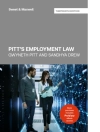With legal fees coming under increasing scrutiny, all law firms, whether they charge by the hour or operate alternative fee arrangements (AFAs) will need to negotiate fees; be it a discount to an hourly rate or a year-long fixed retainer. Budgeting and negotiating skills will be needed by all fee earners with responsibility for agreeing any fees or discounts. The more a firm uses AFAs, the more important budgeting and negotiating becomes. Budgeting and Negotiating Fees with Clients: A Lawyer’s Guide is a must-have handbook for individual lawyers, firm leaders and directors of support services who are looking to tackle these challenges head on at both an operational and a strategic level. It provides: * Clear analysis of the increasing importance of budgeting and negotiating fees for all firms whether they have adopted AFAs or rely on hourly rates; * A step-by-step guide for improving individual behaviour and firm-wide processes; and * Practical tools for generating consistently profitable fee structures. Supported by case studies from law firms and law firm clients, along with input from other management consultants, this report covers topics including: * Fee models adopted by law firms; * How AFAs are intensifying the need for budgeting and negotiating skills; * Alternative fees – risks and how to avoid them; * Understanding law firm financial data – a prerequisite for successful budgeting and negotiation; * Creating a realistic matter budget; * An introduction to legal project management; * Overcoming obstacles to negotiating fees effectively; * Managing the negotiation process effectively; * Obtaining the desired fees and structures; * Tips, tactics and tricks for negotiating; * Developing a strategy for better budgeting and negotiating; * Implementing change and embedding best practice; * Business tools for budgeting, negotiating and client communication; * How to operate value billing; and * Best practice law firm negotiation from a client’s perspective. This invaluable resource also includes supporting checklists and templates to allow readers to start putting the lessons learnt throughout the report into practice immediately.
विषयसूची
Executive summary…VII About the author…IX Acknowledgements…XI Part One: Understanding law firm fee models, budgeting and negotiation Chapter 1: The universal law firm fee continuum…3 Fee models adopted by law firms…3 Introducing the universal law firm fee continuum…4 Common positions on the continuum…4 Why firms must progress along the continuum…7 Chapter 2: How AFAs are intensifying the need for budgeting and negotiating skills…9 Alternative fees: Hype or reality…9 Continued forces of change…10 Impact of AFAs…14 Chapter 3: Alternative fees – Risks and how to avoid them…17 Risk 1: Alternative fees are not as profitable as hourly rates…17 Risk 2: Alternative fees transfer risk to the law firm…18 Risk 3: Alternative fees will lead to commoditization and erode premiums…20 Risk 4: Alternative fee structures are not compatible with billable hours targets…21 Chapter 4: Understanding law firm financial data – A prerequisite for successful budgeting and negotiating…23 The significance of profit…24 The importance of cash…26 Traps for the unwary…28 Actionable data…28 Chapter 5: Creating a realistic matter budget…33 Are budgets necessary?…33 The link between annual and matter budgets…34 Historic price information…35 Matter plans…36 Matter budgets…38 A word on tools…42 Chapter 6: Staying within budget – The art of legal project management…43 Executing the matter plan…43 Monitoring performance and making adjustments…44 Sizing up the legal project management revolution: Origins, implementation and future direction By Pamela Woldow and Douglas Richardson, Edge International…45 Chapter 7: Overcoming obstacles to negotiating fees…53 Overcoming obstacles at the individual lawyer level…53 Firm-wide support…56 Chapter 8: Managing the negotiation process…59 Negotiation stages…59 Chapter 9: How to obtain the desired fees and structures…65 Distinguishing value from price…65 Determining value…65 Creating options…68 Ingredients of winning proposals…69 Chapter 10: Tips, tactics and tricks…71 Tips…71 Tactics…75 Tricks…78 Chapter 11: Developing a strategy for better budgeting and negotiating…81 Taking stock…81 Developing and communicating vision and strategy…83 Chapter 12: Implementing change and embedding best practice…87 Developing personal insight…87 Changing structures and systems…88 Developing firm wide and individual capability…91 Changing firm culture…94 Delivering success…94 Part Two: Case studies Case study 1: DMH Stallard LLP – Business tools for budgeting, negotiating and client communication…101 The business tools…101 How the tools were developed…102 Implementation…102 Impact on the firm…103 Continuous improvement and challenges for the future…104 Case study 2: Crowell & Moring LLP – Using AFAs and value-based billing…105 Alternative fees used by Crowell & Moring…105 Genesis of AFAs at the firm…106 Spotlight on value billing…106 Impact on the firm…108 Client reactions to Crowell & Moring’s fee propositions…108 Continuous improvement and challenges for the future…108 Case study 3: A client perspective…111 Procurement objectives…111 How procurement teams achieve cost savings…111 Preferred fee structures…112 How law firms can prepare for negotiations…113 Behaviour to avoid…114 How to impress…115 Part Three: Appendices Appendix 1: Matter plan template…119 Appendix 2: Matter budget template…121 Appendix 3: Pre-negotiation checklist…123 Index…127
लेखक के बारे में
Sally Dyson is the director of Firm Sense Limited, a specialist consultancy providing client relationship evaluation and advice exclusively to law firms. Sally qualified as a solicitor and practised at Slaughter and May. She then worked as an in-house lawyer for nearly a decade before moving on from the practice of law to found Firm Sense. Sally combines expertise in client listening with an in-depth understanding of law firms and their clients. Sally advises law firms on aligning organisational practices and individual behaviour with client needs in order to improve client retention, win business and improve cash flow and profitability. For more information about Sally or Firm Sense please visit: http://www.firmsense.co.uk












